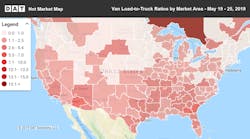Spot truckload freight volumes continued to build during the week ending May 26 and improving van and refrigerated load-to-truck ratios contributed to higher rates on major lanes, said DAT Solutions, which operates the industry’s largest network of load boards.
National average spot van and reefer rates have barely moved this month, however:
National average spot rates through May 26
- Van: $1.80/mile, 1 cent lower than the April average
- Reefer: $2.16/mile, 1 cent higher than April
- Flatbed: $2.29/mile, 4 cents lower than April
Reefer trends: There was good news for reefer carriers as a surge in shipments ahead of Memorial Day weekend lifted rates on 44 of the top 72 reefer lanes. The national average reefer load-to-truck ratio jumped from 2.6 to 2.9, equal to where it was during the first week of May.
Where rates are rising: California’s Central Valley seems to be building toward a typical June peak. Rising reefer volumes produced higher rates on lanes from Sacramento and Fresno, including:
- Sacramento to Salt Lake City, up 39 cents to $2.62/mile
- Fresno to Denver, up 18 cents to $2.27/mile
The bad news? A solid week of rain ahead of Memorial Day has devastated this year’s cherry crop, which was estimated to be more than 10 million cartons—a record. The California Farm Bureau said growers expect to lose nearly two thirds of that amount. Too much rain so close to harvest can cause cherries to split down the side or along the stem, rendering them unsalable except for processing.
Van trends: Rates were higher on 54 of the top 100 van lanes compared to the previous week and the national average van load-to-truck ratio improved from 1.6 to 1.8. That’s still below expectations for this time year.
Where rates are rising: Atlanta, which boasted the highest number of van load posts in the country last week. Rates between Atlanta and Memphis rose in both directions, a hopeful sign that retail goods are on the move. On the other side of the country, two lanes out of Los Angeles drew notice:
- Los Angeles to Denver: $2.50/mile, up 17 cents
- Los Angeles to Seattle: $2.39/mile, up 13 cents, although pricing out of Seattle was weak; the Seattle-L.A. return trip fell 14 cents to $1.16/mile
DAT Trendlines is a weekly snapshot of month-to-date national average rates from DAT RateView, which provides real-time reports on spot market and contract rates, as well as historical rate and capacity trends. The RateView database is comprised of more than $60 billion in freight payments. DAT load boards average 1.2 million load posts searched per business day.



